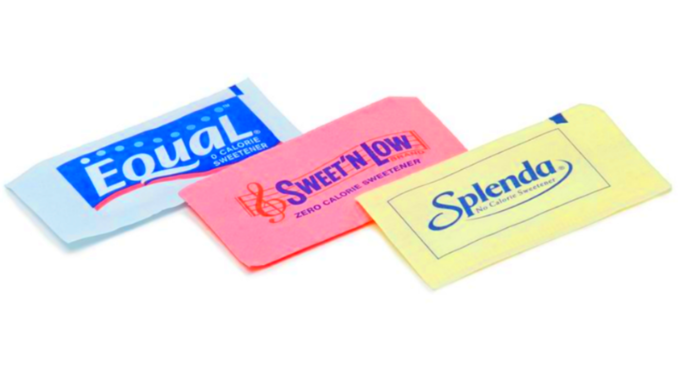
Most people know that too much sugar is bad for you, as excessive sucrose consumption can contribute to poor health including weight gain, inflammation, diabetes, high blood pressure, tooth decay, and fatty liver disease. All of these conditions have been linked to increased risk of stroke and heart attack. Knowing sugar is unhealthy, many people have switched to artificial sweeteners (AS) in their drinks and food. Unfortunately, recently some of these sweet products have also been shown to be a danger to your health in unexpected ways.
Scientists have learned a great deal about the microbiome in the last several years, and the research is only intensifying. A number of studies have been conducted on the effects of saccharin, sucralose, and aspartame vis-à-vis the microbiome, but Aparna Shil and Havovi Chichger, from the School of Life Sciences, Anglia Ruskin University, Cambridge, UK, wanted to collect more data on the subject and designed their study accordingly. They “sought to investigate the role of commonly consumed AS on gut bacterial pathogenicity and gut epithelium-microbiota interactions, using models of microbiota”. Results of their research was reported in the International Journal of Molecular Sciences.
Our study is the first to show that some of the sweeteners most commonly found in food and drink – saccharin, sucralose and aspartame – can make normal and ‘healthy’ gut bacteria become pathogenic.
These pathogenic changes include greater formation of biofilms and increased adhesion and invasion of bacteria into human gut cells. These changes could lead to our own gut bacteria invading and causing damage to our intestine, which can be linked to infection, sepsis and multiple-organ failure.Dr. Havovi Chichger
We know that overconsumption of sugar is a major factor in the development of conditions such as obesity and diabetes. Therefore, it is important that we increase our knowledge of sweeteners versus sugars in the diet to better understand the impact on our health.
Most of the time, I choose something positive to write about for the Night Owl. Occasionally, an important topic catches my attention that I feel strongly you should know about even if it is bound to be bad news for some readers. The health effects of AS on the body are a relatively new area of study and as such, there are many unknowns, controversies, and conflicts of opinion among scientists. Yes, that’s right, scientists frequently disagree, especially regarding new topics of research. As time goes by and more is learned, consensus is gradually reached although it may take years. The study of nicotine and smoking began decades before it was finally declared a health risk. It may take years before we know for certain if AS are as bad as some scientists now think they are, so we’re at the point now with AS that nicotine researchers were in the 1940s and ’50s. The following videos are two and three years old and already a little dated, but they’re good and really the best I could find on the topic.
“What Do Artificial Sweeteners Actually Do to Your Body?” (3:49):
“Are Artificial Sweeteners Bad For You?” (5:25):
Question Of The Night: Do you have a sweet tooth?
